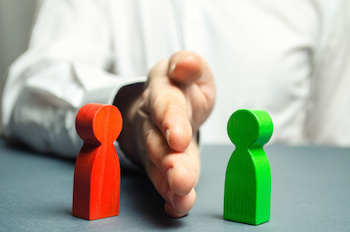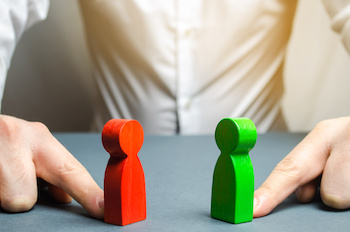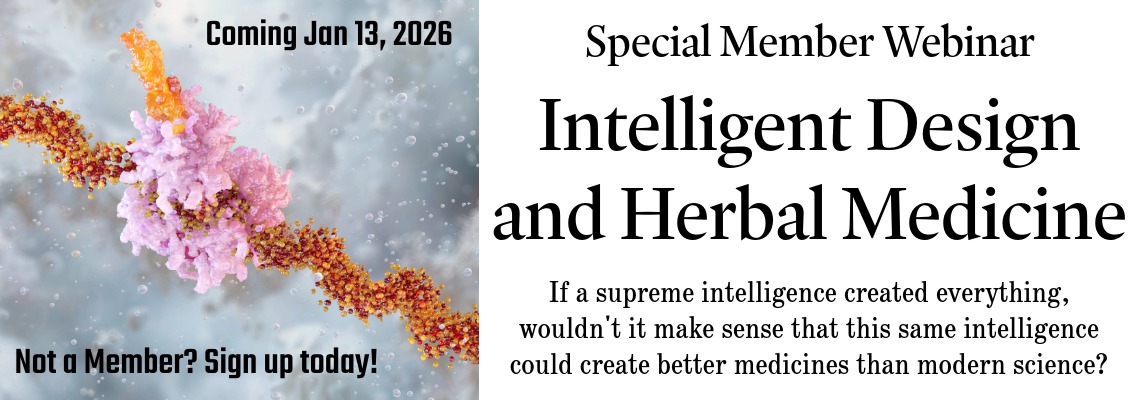 I've been listening to the audiobook of Steven R. Covey's The Third Alternative and its message resonates with my own soul. He talks about how we tend to get caught up in either-or situations where people get polarized on issues. They take one side or the other, each side pushing to get the other side to agree with them. A power struggle ensues in which each side tries to force the other side into giving in.
I've been listening to the audiobook of Steven R. Covey's The Third Alternative and its message resonates with my own soul. He talks about how we tend to get caught up in either-or situations where people get polarized on issues. They take one side or the other, each side pushing to get the other side to agree with them. A power struggle ensues in which each side tries to force the other side into giving in.
When I took a parenting class back in college, many decades ago, one of the secrets I learned was to "side-step the struggle for power." It's so easy to get caught in the desire to force other people to do what you want (children, employees, a spouse, etc.) but doing so destroys relationships and always winds up creating resentment and conflict. It takes creativity to learn to motivate, rather than to force change.
As an adult, I see the struggle for power everywhere. It's especially visible when people are divided into camps such as Democrat versus Republican, the business person versus the environmentalist and so forth. These divisions happen to people in healthcare, too—alternative medicine versus orthodox medicine, those who believe in vaccinations and those who oppose them. vegans versus meat-eaters. The list could go on and on, but in each case, there is a tendency for people on one side to demonize or vilify people on the other side of the debate, because the debate usually isn't about finding solutions to problems, it's about the struggle for power. Who is going to get their way?
I've always had a hard time with power struggles. I'm a natural peacemaker. Even when I was a small child, I hated to hear people fighting. I hated to hear people criticizing other people and speaking badly about them. I've always tended to just like people and wish that I could get along with everyone. In short, I don't like to get into fights with people. It's not that I don't find anything worth fighting for, it's just that most of what is going on around me isn't going to be resolved by escalating conflict.
If someone wants to steal from me or harm me, it's definitely worth getting into a fight over. But fighting over opinions? Why create bad feelings in other people just because you disagree with their opinion on something? I'd rather listen and try to understand where they are coming from, something Steven Covey talks about in this book as one of the critical steps to finding solutions that work for everyone.
I guess I've been lucky since I first heard Steven Covey talk in person when I was only 18. I've been following and implementing his ideas (and those of others like him) since my teens. It's made a big impact on my life, but I'm still learning and I gained an important insight I've never fully understood before as I listed to this book. I learned why people fight over ideas and why I don't like to do so. .
The book explains that people base their identity on the "groups" or ideas that they've identified with. They can't separate their ideas and opinions from their identity. Therefore, something that challenges their opinions, is perceived as a real threat to them personally. Opposing ideas threaten their very identity.
This also helped me understand why I don't get readily offended and usually (but not always) don't feel the need to jump to the defensive when someone disagrees with me. My self-identity isn't tied to my opinions. I'm not hung up on these labels. I realize that like Steven Covey explains in this book I'm a human being, not a set of opinions.
So, although I lean towards more conservative-libertarian ideas in politics, that's not a part of my identity. I can judge an idea on what I think about the merits of it, not on whether it comes from the political right or the political left. I know that national issues are very complex and that I don't have enough information to say with 100% certainty that my ideas are the correct ones. Therefore, when I express my opinion, I'm willing to engage in the process of discussion, because I'm open to looking for the "third alternative" or the solution that will make both sides happy.
Thus, I want to discuss the ideas, evidence, pros and cons, and so forth, on any topic without my ego, or sense of self, getting in the way. I simply want to find the truth. If I'm partly correct, I'm painfully aware that I am probably partly incorrect. Listening to the voices on the other side of the argument with respect and patience helps me see the higher perspective or "third alternative" as Steven Covey calls it. This gives me a more complete picture of the truth and solutions that can help both me and the other party to reach even better solutions.
I'm not going to try to express all the ideas in this book right now, especially when I'm not finished with it, but I do want to highly recommend that you not only read it (or listen to it as I am) but that you start trying to implement what it says. It gives a road map for moving beyond the black and white, us versus them, mentality. We need to see all the possible colors that can be part of the solution.
 In short, we need more peacemakers in the world. We need more people who can transcend their own narrow ideology and help us find broader solutions to our problems. We need this in marriages and families, and we need this in society as a whole
In short, we need more peacemakers in the world. We need more people who can transcend their own narrow ideology and help us find broader solutions to our problems. We need this in marriages and families, and we need this in society as a whole
Why is this so important? Because it's the very essence of healing. To heal is to make whole. Sickness comes from division, from conflict or disharmony. When our body isn't harmonious internally, we get sick. When our relationships aren't harmonious, they get sick. When our society isn't harmonious, it gets sick. That disharmony arises because it becomes the parts of the whole are no longer working together, they are polarized.
The forces of darkness want to divide people, to foster conflict and division. Evil or the Devil, if you prefer, is the father of division and contention. God is one. God is whole. God is unified. Therefore, God is the author of healing and unity. To heal is to make whole. To heal is to bring one closer to the wholeness and oneness that is God. To find the "third alternative" that fixes the problem on both sides of a conflict is to find the higher viewpoint that is nearer to God. That's the job of the genuine healer.
I don't want to just help people heal physically. I have always wanted to help them heal completely, in every aspect of their lives. It's what I desire for myself and it's what I desire for mankind. One of the concepts I learned from Steven R. Covey years ago was, "Be a light, not a judge." Gandhi said it this way, "Be the change you want to see in the world." Or, to extract my own interpretation of what Jesus taught, "It's easy to see the weaknesses in the other person, it's hard to see the weaknesses in you. If you don't want to be a fool, work on your own weaknesses first and then you'll see more clearly to help others work on theirs."
Blessings on your own journey to health and wholeness in life. May you succeed in finding the "third alternative" solution to all the conflicts you encounter in your life.
Steven's Articles
-

-
The Evidence for Berberine
A yellow alkaloid found in traditional infection-fighting…
-

-
The Sensible Use of Caffeinated Herbs
Kola nuts, guarana, and yerba mate and other herbs…
-

-
The Health Benefits and Problems with Coffee
This popular caffeinated beverage can be beneficial…
October
-

-
Understanding Caffeine & Cellular Adaptation
Preserving the power of caffeine's buzz and the…
September
-

-
Horseradish
A pungent spice for aiding protein metabolism…
-

-
Banaba or Crepe Myrtle
A beautiful tree from Southeast Asia whose leaves…
August
-

-
Monkeyflowers
Flower essences to help see ourselves more clearly…
-

-
Mariposa Lilies
Strengthening the bond between mother and child…
-

-
The Noble Bay Leaf
A common kitchen herb for aiding digestion and…
-

-
Epimedium: Horny Goat Weed
A circulatory stimulant and kidney yang tonic…
July
-

-
The Medicinal and Nutritional Benefits of Apricots
A nutritious fruit and valuable medicinal seed for coughs
-

-
Dogwoods
Asian dogwood is used to stop excessive discharge,…
June
-

-
Neem: The Village Pharmacy
A popular Ayurvedic remedy for dental and immune…
-

-
Spilanthes: The Toothache Plant
A traditional remedy for teeth and gums, as well…
-

-
Forsythia
An anti-inflammatory, fever-reducing, and infection fighting herb

